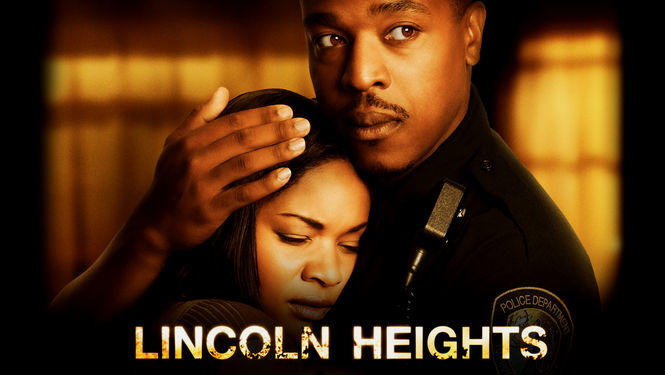In honor of Father’s Day, let’s revisit and reflect on a depiction of a Black father in television that was canceled way too soon.
Lincoln Heights tells the story of the Suttons, a Black family in the Lincoln Heights neighborhood of Los Angeles. The television series shadows the struggles the family has as a result of moving back to the father’s old neighborhood. From kidnapping to community building, Lincoln Heights drops many gems for viewers to digest. Perhaps the most important being the depiction of the father, Eddie. Originally airing on ABC from 2007 to 2009, the Sutton family unit consists of the mother Jenn (Nicki Micheaux), the father Eddie, played by Russell Hornsby, and their three children Cassie (Erica Hubbard), Lizzie (Rhyon Nicole Brown) and Tay (Mishon Ratliff).
Eddie Sutton is a police officer who is committed to improving his community and leading by example. Understanding his commitment to both his profession and his neighborhood, he uses his position to pushback against the conditioning of only viewing community members as suspects and humans. Which is important, because his resolve is tested from the very beginning of the series. At the end of episode one, in an armed robbery gone tragically wrong, Eddie shoots and kills Donelle, a young gang-affiliated high school student who has a penchant for literature and is a natural leader but lacks the proper outlets and has given up all hope for the future. Eddie, in what we learn is core Eddie fashion, is a realistic optimist who believes he can help guide Donelle to a life path with a less likely chance of landing him in the morgue or prison. However, before this is materialized, Donelle reluctantly aids his friends in the robbery of a local convenience store.
Just before his final breath, Donelle informs Officer Sutton that he was actually considering attending his youth program at the local community center. This scene, compounded with the handling of the shooting by both the police force and the community, in addition to the ramifications on his family, not only demonstrates the superb talent Hornsby is as an actor but also establishes who Eddie is as a character.
As someone who operates from a position of high emotional awareness and integrity, it is extremely challenging for Eddie to have his intentions questioned concerning why he moved his family back into his old neighborhood and whether or not he followed proper protocol when firing on Donelle, but he handles it with an extreme sense of grace and poise, while still protecting his community and guiding his family. This is only one of the reasons this character is so endearing as an onscreen father.
In his role, Hornsby is vulnerable when explaining his remorse, raw when pushing back against injustice, and relentless in his pursuit of the truth, while always managing to stay true to his moral compass–even when he isn’t sure if it will cause the life he has built to come crashing down around him. This is best exemplified throughout the series from moments as contentious as being accused of being biased against his eldest daughter’s love interest based on his race, to as moments as emotionally charged as facing and healing the residual trauma and impact of his mother being killed in a drive-by shooting during his youth. At nearly every turn, even if begrudgingly, Eddie forces himself to do the hard work of self-reflection.
Another reason why Eddie Sutton is claimed in the hearts of many as one of the greatest TV dads is how the show battled against the stereotype of monolithic Black masculinity. One prime example is when Tay is bullied for not being “Black enough,” he counsels him on the choices he has to make now that will shape the type of person he will become in the future. To drive the point home further, for Tay’s 13th birthday/transition into manhood celebration, Eddie uses the examples of his father and father-in-law, two distinctly different men, both heroic and troubled in their own ways, to provide concrete examples of how Blackness and masculinity are multidimensional.
For all of his positive attributes, Eddie is not without flaws. The most significant being his unwillingness/inability to admit when he needs help, or to accept it when offered. Unfortunately, this plays out in one of the children after her kidnapping. However, this obstacle is used as a learning opportunity for all, and the importance of mental health and strategies are reinforced. We get to see this pushed even further when Nate Ray, played by Chadwick Boseman, is introduced as the son he never knew he had, who happens to suffer from PTSD from his time on active duty in the military.
In addition to being a charismatic and fully involved father who wants to provide a better home for his family, he is a committed parent and spouse, ardent friend and dedicated community builder who encourages building up a community and not just working in it, or living in it. He supports his wife, values her opinion and co-leads the family from a place of compassion. With his children, he provides sage wisdom and makes time where it doesn’t exist. Eddie Sutton is one representation of the many father figures we celebrate this weekend.
Happy Father’s Day!
READ MORE:
The Rise of Black Male Mental Health Awareness In Primetime TV
9 Dope, Black Web Series To Dive Into For The Summer
Photo: Hulu
Porscheoy Brice is an editor at Shadow And Act. She is also the editor-in-chief of msmalcolmhughes.com. She is a Chicago, IL native. In the words of the genius Jay-Z, she is “Pretty, Witty, Girly, Worldly; One who likes to party, but comes home early.” You can follow her on social media @msmalcolmhughes.

